-
 Kenosha Kid
3.2kMaybe global coordination really is an impossible situation to bring about — Janus
Kenosha Kid
3.2kMaybe global coordination really is an impossible situation to bring about — Janus
Global coordination has to be executed by leaders. Leaders who seek environmental reforms tend to get democratically replaced by leaders to wish to reverse them. Ultimately the problem is in convincing a stable majority that the good of their great grandchildren is their concern. Unfortunately you can't convince a stable majority of Americans that access to life-saving medical care for their immediate family is a good thing. How on Earth do you convince them to care more about relatives they'll likely never meet? -
 ssu
9.8kI'd love to hear what the brightest minds have to say about our greatest problems and the one greatest problem that is behind them all; overpopulation. — JanusThe point is that we cannot feed the world population sustainably. — Janus
ssu
9.8kI'd love to hear what the brightest minds have to say about our greatest problems and the one greatest problem that is behind them all; overpopulation. — JanusThe point is that we cannot feed the world population sustainably. — Janus
Not the brightest here anyway, but here's my five cents.
Firstly, Let's first look at how the amount of people dying of famine has gone:

Just like with absolute povetry, there has been a huge transformation in the World in our time that we, typically in the West, don't notice as our economic growth has been crappy.

Yes, there are areas like the Sahel that indeed are facing problems, but the large scale povetry of the 20th Century and the widespread famine experienced in the last century is basically diminishing.
Secondly, human populations sustain their numbers and only grow if women have more than 2,1 children on the average (that's the fertility rate). And as especially Asia with China and India are having lower fertility rates, this has a huge impact on global population. See just how many countries are below the replacement rate here. This is how the situation is on the map:
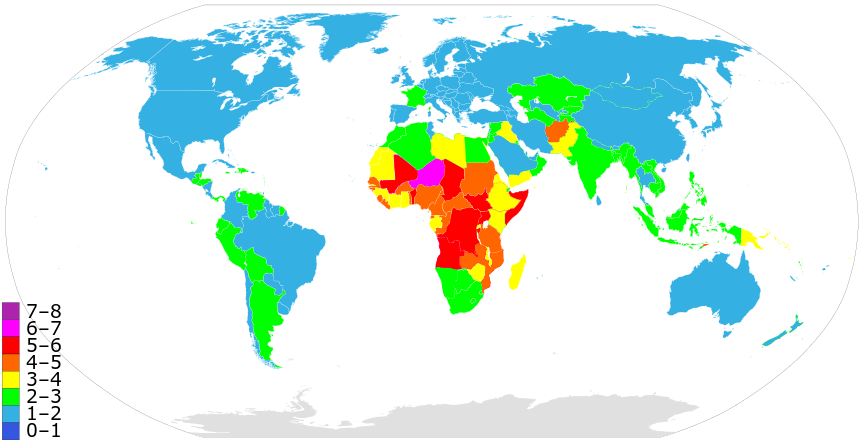
India is the perfect example here in that it never made such drastic measures as China on child policy, yet the fertility rate has gone down thanks to economic growth and the country isn't facing a demographic problem like China:

So, you do understand that you might even see THE PEAK OF HUMAN POPULATION in your lifetime as it might be that in 2100 there are less people than at the height of this Century. Demographics can estimate quite well the next fifty years or so, you know.
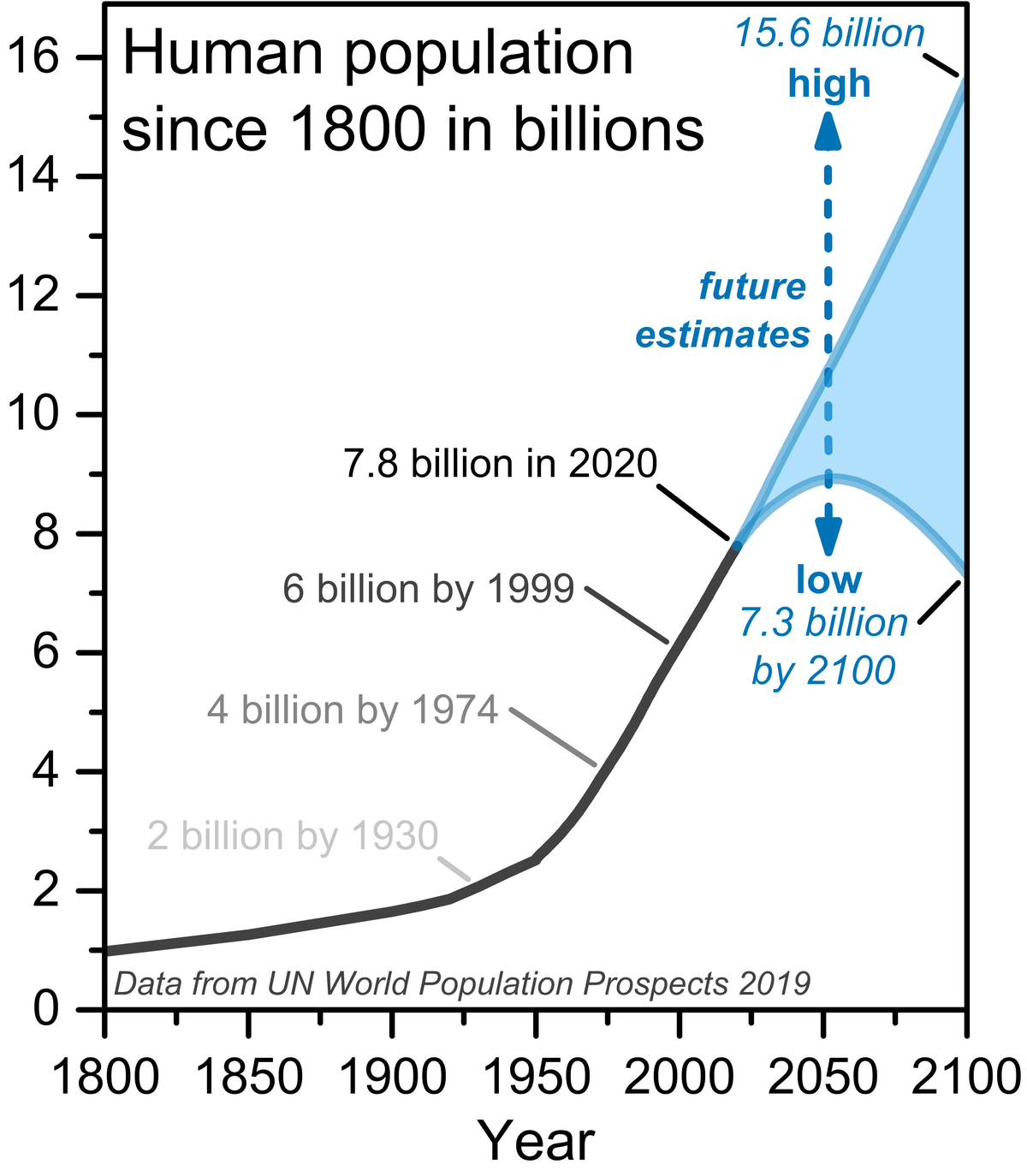
Fertility rates fall if people come more prosperous. Rich people have fewer children. And more prosperous societies have the ability to take care more of their environment. Hence in truth if people want to tackle overpopulation, the real cure might at first sound totally absurd: take care that the economy improves, that people aren't so poor and have children as a retirement plan (someone that will look after them). More prosperous societies can institute dramatic change on agriculture and increase the efficiency of the production dramatically. Let's remember that THE NETHERLANDS is the second biggest exporter of agricultural products (in billions of dollars) in the World, so the possibility to get global agricultural production to the level where it's now in the Netherlands is a real answer here. Subsistence farming isn't the answer, it's the problem.
Is this the future:

Or this:

Simple naive solutions can backfire: Drastic cuts that just force the poorest countries int a huge depression and ending globalization can make the situation go back where it was last century, with more perilous consequences now and create a vicious circle. International cooperation, smart policies that ensure that poor countries prosper and have the ability to tackle their problems as richer countries have done is the answer. -
 sucking lollipops
7I don’t know if I’d agree with that, nor do I think that Capitalism rests on the distance of a reserve army of unemployed. The whole Capitalism thing seems like an easy blame game in terms of over population. — Brett
sucking lollipops
7I don’t know if I’d agree with that, nor do I think that Capitalism rests on the distance of a reserve army of unemployed. The whole Capitalism thing seems like an easy blame game in terms of over population. — Brett
On the contrary, the whole "overpopulation" thing is the easy blame game in terms of capitalism.
There might be a lot of reasons in poorer countries for people having children or having what might be regarded as too many and adding to problems. Women might get pregnant against their will, adults might have children to help with what’s needed to survive. There was a time when men preferred to have boys because they were of more use to them in terms of working the land or whatever else was needed. So there may be all sorts of reasons for having children that we can’t comprehend. — Brett
No shit! And there might be a lot of reasons people in rich countries waste like there's no tomorrow, so obviously capitalism has nothing to do with it :100:
The so called reserve army of unemployed would consist of a lot of people with no skills at all, people who can’t even read and write. The profits you might be referring to come from a cheap labour force. In fact a population of healthy, educated people is the real benefit to Capitalists. — Brett
Yeah, I'm dead sure that capitalists think like that too. That's probably why capitalists lobby for workers' health, education and increased wages the world over.
That’s not very reasonable either. You have to be clear about who you’re referring to. Most parents are good at what they do under many different and trying conditions. — Brett
Good like marrying kids against their will or having them to sustain themselves instead of uniting with their class to get what they deserve? That seems totally reasonable. I was clear where I was referring to, I gave 4-5 examples which you left out of the quote.
people must come to understand and care about the real situation. I'm not proposing actual solutions, but trying to encourage discussion about the scope of the problem, and maybe the kinds of things we might expect any practicable solution to involve. — Janus
What's the real situation and who are the people that must come to understand it? You frame the "overpopulation problem" in terms of sustainability. How did Brett translated it? Where did he refer to when he was addressing excess population? To "the poor countries"; where women might get pregnant against their will. But we know that it is the rich countries that are the less sustainable, don't we? This twisting is the norm in discussions about the "overpopulation problem". So, if it's about sustainability, and if people have to understand what the real situation is, do we agree that it is primarily the rich people and nations that should care about the real situation cause they are the main problem? And if we agree on that do we agree that the problem is better framed as a class issue? -
 ssu
9.8k
ssu
9.8k
I'd say it really won't be, if we are smart.
I think that Amartya Sen, the Indian nobel-economist, has a point when he argues that basically famine is the result of the collapse of the market. Many times it's a war fighting strategy. These issues are more complex than the simple answer given sometimes to us.
Yet we can feed ourselves. With more efficient agriculture we could feed far more with it being more environmentally friendly and sustainable. As I said, the difference between a Western farmer and agriculture and a African subsistence farmer plowing his or her land is huge. Yet Africa could be the next bread basket of the World.
I'd say that climate change is a bigger issue. The nightmare scenario is of course that globalization and international cooperation just collapses. Like a conflict between China and the US (or Russia or both). -
 Judaka
1.7k
Judaka
1.7k
Err no, capitalism bad because uhh, capitalists and consumers being fattened up and slavery for our pleasure. Resources could run out in 5-10 years and talk about the bigger picture is needed now and we need to be mature and talk about resolutions? Please do not respond with evidence, are you siding with the capitalists? -
 Kenosha Kid
3.2k
Kenosha Kid
3.2k
In a nutshell, then, your solution to the overpopulation problem is to increase agricultural supply to meet the demands of an overpopulated world in the hope that population goes into recession afterwards.
Consumer capitalism does depend on having winners and losers. Profit always has to be at someone's detriment. The neat solution to this for increasing prosperity overall has been globalisation: exploiting the existing wealth disparities across nations to their mutual benefit. This possibility disappears when that disparity disappears.
The result of uniform prosperity is not to make the world as prosperous as the developed West, but to reduce the prosperity of the West down to some Goldilocks zone with everyone else, which in itself is fine. By your own logic, while this might decrease population expansion in developing nations, it would increase it in developed ones.
The optimum sustainable population under feasible conditions is likely not a number equal to or greater than the current world population, even taking into account scientific optimisation of resources. The world population is three times what would be currently sustainable if we were all middle-income Europeans. Science can reduce that ratio but it's not a magic wand. Focussing on meeting the demands of the current population and bringing everyone to prosperity does not strike me as an answer. -
 0 thru 9
1.5kGlobal meta-problems such as (possible) overpopulation are all interlinked and interrelated. This is not to deny, dismiss, or underestimate any of them, such as global warming, deforestation, rapid species extinction, etc. It is to confirm their complexity (as a nearly unimaginable exponential of the complexity of even a single bacterium cell). Underlining their shared complexity, and their perhaps shared and common causes, to be discussed below.
0 thru 9
1.5kGlobal meta-problems such as (possible) overpopulation are all interlinked and interrelated. This is not to deny, dismiss, or underestimate any of them, such as global warming, deforestation, rapid species extinction, etc. It is to confirm their complexity (as a nearly unimaginable exponential of the complexity of even a single bacterium cell). Underlining their shared complexity, and their perhaps shared and common causes, to be discussed below.
One could debate or quibble about the details, terminology, blame, solutions, and fine print but the broad outlines are there for all who have eyes to see. To continue as we are at an current ever-increasing rate is unsustainable for human life at anywhere near our conception of manageable living standards. (I won’t say that this is undeniable, because nearly anything no matter how accurate, helpful, or correct can be ignored or denied. Such is the power of the human ability of abstraction).
So we are talking about a continued HUMAN existence, hopefully above living in piles of smoldering radioactive waste. The planet Earth will be fine in a billion years, regardless of us.
So, as regards humans, we look to human activities, and their effects on the immediate environment, as well as the effect on the whole planet. Human activities are based on (or at the very least GUIDED BY) some kind of thinking. Thinking “rests on” or is “founded upon” what could be called “beliefs” or “givens”. (One could say that beliefs are thoughts in themselves. Perhaps. But they are the largely unconscious primal ideas we have about ourselves, the world, the gods (if any), human destiny, etc. In other words, our mythologies. Or our archetypal systems, as Jung might put it. Though, as an aside, if one were to claim that they had absolutely NO beliefs, unconscious archetypes, or mythology of any kind... that they had only pure conscious and logical rationality 100% of the time which dictated their every action... well, that is an impasse. And at that sticking point there probably isn’t much further I could respond.)
(So, VERY broadly and generally)...
Beliefs -> Thoughts-> Actions -> Effect
The point of all this is that our “problem” is most likely at the belief / mythology level.
Imagine if you will a tribe or small group of people act upon the belief (for example) that the earth is mostly dead matter along with some growing things that are near worthless unless they can be put to some specific human purpose. IE, THEIR SPECIFIC HUMAN PURPOSE OF THE MOMENT. (Whatever that may be). This tribe would probably tend to be quite wasteful, heedless, rapacious, and perhaps even unpleasant. Which is their choice, one could say. It is their right to live like a swarm of locusts... locusts with human size, intellect, and powers. They could consume and destroy a small area, and then move on somewhere else to repeat the process, ad infinitum and ad nauseum.
If this were a group in the hundreds of people, it would not have much of an effect on global systems. If this were a culture in the billions of humans, it almost undoubtedly would. In very general terms, this is where we now stand. -
 0 thru 9
1.5kWe are all being screwed (to varying degrees) by the financial elites, in a system in which we are all hopelessly complicit. We expect our politicians to do something, but our politicians are too cowardly, or stupid, or "in the pockets of the plutocrats" or just plain impotent to do anything, other than make vague promises, about doing "something".
0 thru 9
1.5kWe are all being screwed (to varying degrees) by the financial elites, in a system in which we are all hopelessly complicit. We expect our politicians to do something, but our politicians are too cowardly, or stupid, or "in the pockets of the plutocrats" or just plain impotent to do anything, other than make vague promises, about doing "something".
The angry outrage is the outcry of systemic impotence; it's all noise in a deadly vacuum. Predictably, once some degree of the customary comfort is restored, we will settle back into, as much as resources allow, "business as usual", and we'll do that until resources no longer allow. That is what is coming; whether next year, or in five, ten, twenty or fifty years.
The greatest problems we collectively face are resource depletion, destruction of habitat, species extinctions, destruction of soils by the industrial agricultural machine that is needed to feed our absurdly over-bloated numbers. — Janus
With the exception of minute quibbles, I would agree with this, as well as the rest of the OP. We can word the situation this way or that, propose various possible solutions, or even press on like it’s “morning in America” circa 1950, but the situation has become a brute fact.
In I recall correctly (?) from long ago, you had read many of Charles Eisenstein’s works. I have as well, and find his writings on these general subjects very rational and factual. I have yet to see any misinformation or hyperbole in his books. And simultaneously, his style is very deep or intuitive (or whatever very complimentary touchy-feeling terms one prefers, lol.) He seems to me to carry on from the tradition of (among others) Jared Diamond (in terms of a scientific or academic position). And in the vein of the late great Daniel Quinn (in an mythic anthropological way, so to speak.)
For those perhaps less familiar, Eisenstein has several books covering (and deftly tying together) topics like ecology, economics, education, food, beliefs, governance, etc. His initial tome is The Ascent of Humanity. It is available for purchase on the usual places. And also available (for optional donation, as are his other books), both English text to read online as well as an audio version, on his website.
https://charleseisenstein.org/books/ascent-of-humanity/ -
 ssu
9.8k
ssu
9.8k
And this is the core error that has been and still is ever so popular on the leftist side. Note the word "always", which is the problem. Not that sometimes, but always. That improvement, that profits have to be taken from someone else. To profit one HAS TO BE stealing from others. Wealth cannot be created, but only taken away from someone else.Profit always has to be at someone's detriment. — Kenosha Kid
Hence if you Kenosha Kid lets say invent a battery for smart phones that uses 50% less raw materials giving 80% more power with half of the production cost, obviously you could sell it at half price compared to other battery makers and people likely would opt for the cheaper far better battery. So for who's detriment, from who would you rob your dirty profits? What diabolical evil would you do? That other battery producers would be forced to change to use your technology also? Or would the narrative simply be that you are simply using predatory pricing and hence forcing poor workers to be unemployed at other factories with your cheap batteries, so shame on you? Forget the "improvements" in your battery design, you make things worse as people buy more smart phones! So F*k you and your inventions! Who needs better battery technology?
Hence basically you are against the idea of more prosperity. You basically believe that poor countries today could not have it as good as we have it now.The result of uniform prosperity is not to make the world as prosperous as the developed West, but to reduce the prosperity of the West down to some Goldilocks zone with everyone else, which in itself is fine. — Kenosha Kid
It isn't about sustainable development, recycling, protecting the environment and tackling the problems we have etc. but truly an idea of REDUCING PROSPERITY. Let that just sink in for a moment. The actual inherent evil in this craving for a better more simple time and being against the materialism would be seen if this truly happened. It hasn't happened, but who cares. The discourse is disjointed from the real world to a narrative of ideals that simply don't bother with facts. And what is so bad in increasing prosperity and reducing povetry? As if increasing prosperity means rampant hedonistic materialism and being utterly uncritical of the present system. Or is the only morally correct way to decrease povetry through income transfers? Is it bad for poor or middle class people to be more affluent?
Because what on Earth would be that "Goldilocks zone" you would deem appropriate for us? The US of the 1980's? Western Europe of the 1990's? Even if we take the present as the goldilocks, is really the goldilocks zone a world where we still die from heart attacks and have corona viruses? What would be so wrong in a World where people on average live to be 100 years or over and have less disease than now and have at their home a fridge, electric oven and clean drinkable running water?
(Data from Canada obviously missing)
The basic problem is that people who think all of our problems are because capitalism simply don't make much effort to understand how the economy works and how much improvement there actually has happened in the last fifty years. Perhaps it's confusing to be both critical of the problems that capitalism has and do exist, yet acknowledge that many things have improved under our less than perfect capitalist system.
More prosperous societies can solve those problems that have emerged (and there are many) far better than poor societies. -
 staticphoton
141Racism, sexism, classism, exploitation by the elite, etc... have been traits of most societies since long, long before the earth was overpopulated by humans.
staticphoton
141Racism, sexism, classism, exploitation by the elite, etc... have been traits of most societies since long, long before the earth was overpopulated by humans. -
 Wheatley
2.3k
Wheatley
2.3k
It's definitely more complicated than that. China's Ghost cities are an indirect result of their significant gender imbalance.The existence of China's never inhabited ghost cities may indicate that the promise of economic growth to lift populations out of extreme poverty may be somewhat overrated, or at least shortsighted. — praxis -
 Kenosha Kid
3.2kThe result of uniform prosperity is not to make the world as prosperous as the developed West, but to reduce the prosperity of the West down to some Goldilocks zone with everyone else, which in itself is fine.
Kenosha Kid
3.2kThe result of uniform prosperity is not to make the world as prosperous as the developed West, but to reduce the prosperity of the West down to some Goldilocks zone with everyone else, which in itself is fine.
— Kenosha Kid
Hence basically you are against the idea of more prosperity. You basically believe that poor countries today could not have it as good as we have it now. — ssu
Apparently not.
Because what on Earth would be that "Goldilocks zone" you would deem appropriate for us? The US of the 1980's? Western Europe of the 1990's? Even if we take the present as the goldilocks, is really the goldilocks zone a world where we still die from heart attacks and have corona viruses? — ssu
Would any of those meet the definition of the Goldilocks zone I gave of "uniform prosperity"?
Perhaps it's confusing to be both critical of the problems that capitalism has and do exist, yet acknowledge that many things have improved under our less than perfect capitalist system. — ssu
It's not confusing at all. Your ideal vision was to make the world prosperous. If you understand that capitalism is "less than perfect", how consistent can it be with this perfect world you believe possible?
Hence if you Kenosha Kid lets say invent a battery for smart phones that uses 50% less raw materials giving 80% more power with half of the production cost, obviously you could sell it at half price compared to other battery makers and people likely would opt for the cheaper far better battery. — ssu
This is a dream, not a plan. The reality is that I put my competitors out of business by undercutting them, making them poorer and me richer. My next move would be to do a Shkreli and hike up the price of my battery. Because I am a capitalist. That is my job: to take money from the many and put it into my hands.
And presumably I'm not hand-making these personally, right? To undercut my competitors I'm probably going to rely on the economic disparity between my prosperous country and somewhere much less prosperous in East Asia somewhere. And if not, I'm certainly going to have to rely on wage labour.
Economic inequality is built into every capitalist venture from the start, and its ends are to maximise personal profits. It is not that people don't understand capitalism, it's that they know it far too well and don't believe in capitalist and right-wing fairy tales anymore. -
 ssu
9.8k
ssu
9.8k
Does central planning work so great all the time?The existence of China's never inhabited ghost cities may indicate that the promise of economic growth to lift populations out of extreme poverty may be somewhat overrated, or at least shortsighted. — praxis
And is the following statistic inherently bad?
You should remember that the size of the Chinese economy was at the start of the 1990's equivalent to the size of the GDP of Netherlands. And now it's bigger. And povetry has been reduced. The fact is that it hasn't been overrated or short sighted what the Chinese have been able to do. The country has genuinely gotten more prosperous. Sub-Saharan Africa, not so.
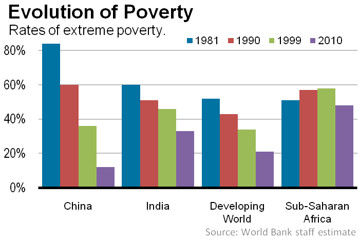
-
 ssu
9.8k
ssu
9.8k
I don't believe the World is perfect, but I can see when some things work better than others. History tells it. Starting from the most clear examples of when a countries have been divided into two with one part going with capitalism and the other with socialism. A better example could not be given.Your ideal vision was to make the world prosperous. If you understand that capitalism is "less than perfect", how consistent can it be with this perfect world you believe possible? — Kenosha Kid
And I don't believe in ideologies and idealists like anarcho-capitalists or marxists. The fact is that you need a so-called mixed approach when you look at countries that have truly prospered. You need free markets, but also you need labour laws, functioning labour unions, functioning and effective institutions that do prevent corruption, lawlessness and guarantees even the poor their rights to their property etc.
You underestimate the competition. You think they would stand idle when they simply could copy your technology? You could bitch and moan about intellectual theft, of course. But no way you can buy a monopoly from all the power elites of the world.The reality is that I put my competitors out of business by undercutting them, making them poorer and me richer. — Kenosha Kid
(Kenosha Kids competition. In so-called "communist" China, of course)

You know, the Byzantine court used the predatory pricing in silk production to bankrupt private competition and gain monopoly, but notice that monopolies aren't typical in our globalized World. If you would be successful, then you would be one of the ten or so battery makers in the World. And we seem to forget that in the history of capitalism trust-busting happened too: there's no Standard Oil today as there was earlier. We just now have forgotten that the US did something about the robber barons, as they were called in their day.My next move would be to do a Shkreli and hike up the price of my battery. Because I am a capitalist. That is my job: to take money from the many and put it into my hands. — Kenosha Kid
So let's say you would be a genuine risk taker and go for the cheapest labour anywhere with in mind to shorten your manufacturing distances. So why wouldn't you take the bold move to produce the batteries right there where the raw materials are extracted in the DRC?And presumably I'm not hand-making these personally, right? To undercut my competitors I'm probably going to rely on the economic disparity between my prosperous country and somewhere much less prosperous in East Asia somewhere. And if not, I'm certainly going to have to rely on wage labour. — Kenosha Kid
Yep, just look how low the salaries are in the DRC!

Fine. So why would it be bad if one of the most poor countries in the World suddenly get an advanced and extremely competitive tech industry that uses domestic resources giving a headache to Chinese battery manufacturers? I think the Congolese would be happy about it.
(Kenosha Kid, on the left, showing his new Congolese battery factory to the local DRC elite?)
-
 praxis
7.1kThe fact is that it hasn't been overrated or short sighted what the Chinese have been able to do. — ssu
praxis
7.1kThe fact is that it hasn't been overrated or short sighted what the Chinese have been able to do. — ssu
Wasted infrastructure is the result of an overestimation. Endless economic growth is inherently short-sighted because it's unquestionably unsustainable. The economic growth of China and other countries will inevitably fall to the rates of developed economies and by that time global resources or in particular cheap energy, the backbone of economic growth, will be further diminished. Economic downturns will become more frequent and longer lasting, in fact this may already be happening. -
TheMadFool
13.8k@ssu Made some changes according to the information you provided
A back of the envelope calculation suggests that a solution for overpopulation could come in the form of utilizing space efficiently, especially vertical space.
The world's tallest skyscraper is the Burj Khalifa at 828 meters. It has a total floor area of approximately 300,000 square meters distributed among 163 floors.
Each floor has an area of 1840 square meters. The average house has an area of 200 square meters and so each floor of the Burj Khalifa has an area of 9 average houses.
Each household consists of roughly 3 people. Ergo, each floor of the Burj Khalifa can hold 27 people, consisting of 9 average-sized families.
Therefore, Burj Khalifa has space for 163 * 27 = 4,401 people
There are about 8,000,000,000 people on the planet. To accommodate them all, we need 8,000,000,000 / 4,401 = approximately 2,000,000 (2 million) Burj Khalifas
These 2 million Burj Khalifas will occupy an area = 2,000,000 * 0.00148 square km = 2,960 square km, an area slightly larger than the Pacific island nation of Samoa:
-
 ssu
9.8k
ssu
9.8k
Better to build homes, make the largest high speed rail system than spend the billions in stock buy backs.Wasted infrastructure is the result of an overestimation. Endless economic growth is inherently short-sighted because it's unquestionably unsustainable. — praxis

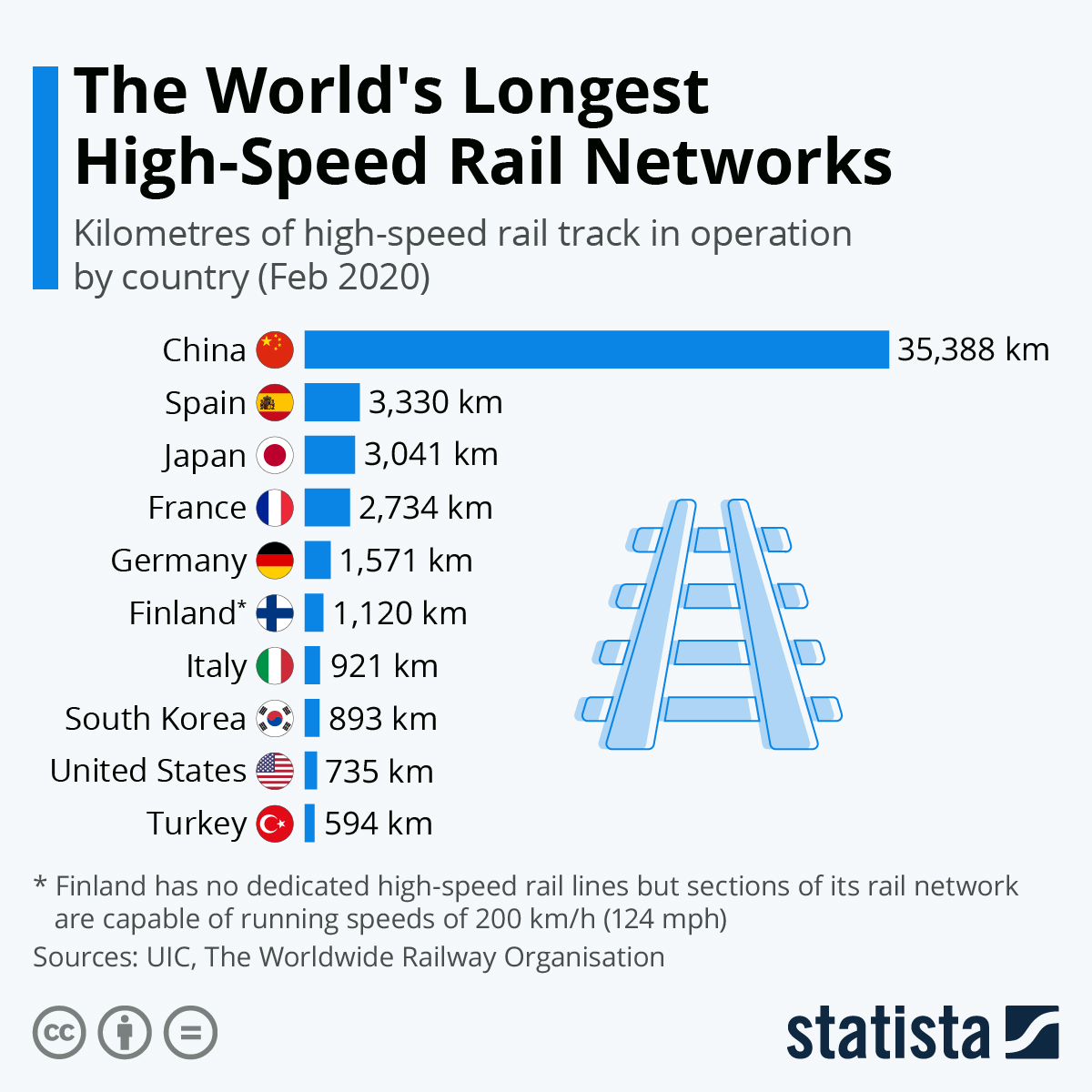
Then there is the highway system, here compared with the US highway system (that was basically built during the Eisenhower/Kennedy/Johnson administrations).

Dividends have a point, but trillions of dollars buybacks when the income disappears in a stock market crash? Or right, we don't have those because the central banks support the markets (so long free markets). In the end, there are more stupid ways to use money than building infrastructure, even if part of those investments are stupid.
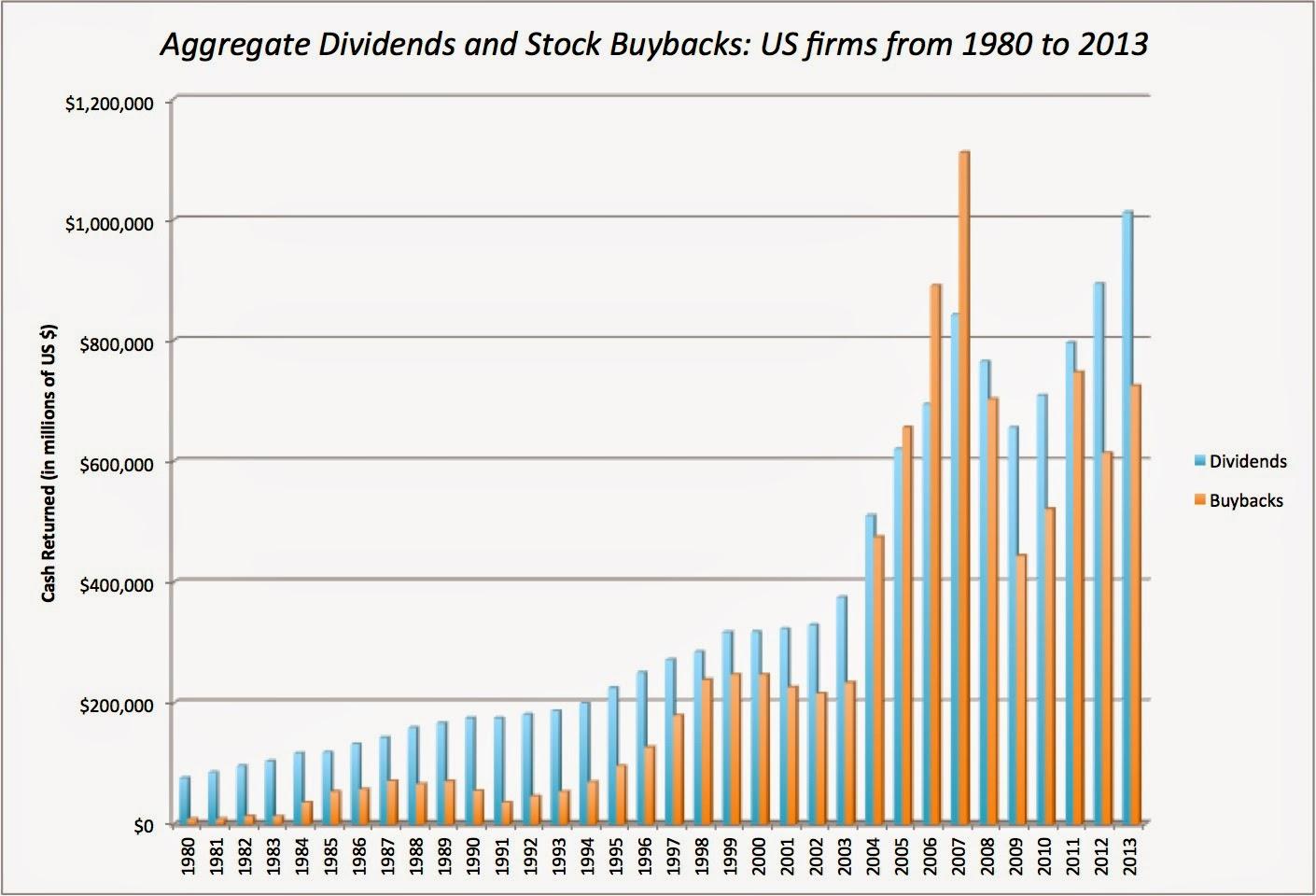
Drastic economic downturns have been with us for at least 250 years.Economic downturns will become more frequent and longer lasting, in fact this may already be happening. — praxis
Yes. Nobody is forecasting a 20% growth in the US economy and why should it be so? If the poorer countries get more wealthy, sure, the growth rates will come down. And if the global population growth stops and starts to diminish, why would we need rapid economic growth?The economic growth of China and other countries will inevitably fall to the rates of developed economies and by that time global resources or in particular cheap energy, the backbone of economic growth, will be further diminished — praxis
And the scarcity problem?
What actually is different from the end of the 19th Century, because you could have made similar arguments then as, oh wait, I think Malthus already did it already in the end of the 18th Century? (So a hundred years earlier, sorry). And after him it was William Foster Lloyd with his essay "The Tragedy of Commons" from 1833. So anything here isn't really new. I'm not saying that either Malthus or Lloyd don't have a point or that they are utterly wrong, they do make good points, but putting their theories on a pedestal and treating them as some sacrosanct truths isn't useful. Doom & gloom is so trendy, it's so hip now and has been for ages. Any hint of optimism seems to some that the optimist is either naive or that he or she is totally uncritical of everything. Because we are surely fine to the living we have now than the situation we had prior to the industrial revolution. -
 ssu
9.8kExcept they wouldn't, I think.
ssu
9.8kExcept they wouldn't, I think.
You see that 300 000 square meters is the total of all floors combined. The area you calculated is if the similar amount of square meters in 800 000 Burj Khalifas would be built in single floor homes. Yes, that might be close to the area of Uganda. Yet the Burj Khalifa, the actual building, I think is takes far less than 10 000 square meters of the real estate land in Dubai where it stands.
So the one huge American style city built with suburbs for that much people would take the size of Uganda, with no 2-floor or higher buildings. (Then the traffic jams...) -
 ssu
9.8k
ssu
9.8k
Read, learn and use more than one reference, that's all it takes. If you read enough you will notice that neither peak oil or climate change clearly are fake. For such complex issues there's no distinct "truth" or a yes or no answer. Peak conventional oil has already happened some years ago. We already have seen what happens with over 100 dollar prices (the global economy halts) and that we can be in a situation of negative oil prices in the US (because, hey, it's a casino). And climate change is similar, quite true thing.I imagine that because of the money and big players involved it's difficult to know who's telling the truth about peak oil, climate change, and the like. — praxis
Perhaps the answer is in being critical of the worst, most dire and most alarmist forecasts made about anything. This doesn't mean the same as totally opposing the thing. The worst/most alarmist forecasts about anything are usually made to "wake up" people, to get the media to pick the issue up, for us to notice it. It approaches more the rhetorical side. Simply there is an agenda to promote than an observation of the facts. This doesn't mean that all is fake. It may seem lame then to say "well, it's not going to be that bad", but usually that is the most realistic case. We humans adapt very well.
After all, we are now living during the worst pandemic in a century (and perhaps in the worst economic depression too) and the World hasn't collapsed around us. Likely will be there for 2021 too.
Not a Mad Max world yet. -
 Key
45Besides, women are squeezed out of their rightful contraception, away from possible emergency abortion and to give births against their will only to fuel the flames of evil, tragedies guaranteed! — DrOlsnesLea
Key
45Besides, women are squeezed out of their rightful contraception, away from possible emergency abortion and to give births against their will only to fuel the flames of evil, tragedies guaranteed! — DrOlsnesLea
I believe you are mistaken as to the usage of the word "contraception." -
 Kenosha Kid
3.2kStarting from the most clear examples of when a countries have been divided into two with one part going with capitalism and the other with socialism. A better example could not be given. — ssu
Kenosha Kid
3.2kStarting from the most clear examples of when a countries have been divided into two with one part going with capitalism and the other with socialism. A better example could not be given. — ssu
So really you're political ideology is: not socialism! Okay we can agree we're not likely to solve the problem with socialism. Although for your several reminders about increased Chinese prosperity, it is worth remembering that it wasn't that which lowered their population growth.
You underestimate the competition. You think they would stand idle when they simply could copy your technology? You could bitch and moan about intellectual theft, of course. But no way you can buy a monopoly from all the power elites of the world. — ssu
Is that how HIV medication came to cost hundreds of dollars a pop in the US? Healthy, if slightly criminal competition? This is wishful thinking, methinks.
So why wouldn't you take the bold move to produce the batteries right there where the raw materials are extracted in the DRC? — ssu
You skipped over Madagascar! I'm a keen scuba diver, and I heard monkeys work for peanuts and lions can be trained.
So why would it be bad if one of the most poor countries in the World suddenly get an advanced and extremely competitive tech industry that uses domestic resources giving a headache to Chinese battery manufacturers? — ssu
It's not. But this already depends on massive economic disparity between the trader and the place if production. This is not the universal prosperity dream you're selling.
Welcome to The Philosophy Forum!
Get involved in philosophical discussions about knowledge, truth, language, consciousness, science, politics, religion, logic and mathematics, art, history, and lots more. No ads, no clutter, and very little agreement — just fascinating conversations.
Categories
- Guest category
- Phil. Writing Challenge - June 2025
- The Lounge
- General Philosophy
- Metaphysics & Epistemology
- Philosophy of Mind
- Ethics
- Political Philosophy
- Philosophy of Art
- Logic & Philosophy of Mathematics
- Philosophy of Religion
- Philosophy of Science
- Philosophy of Language
- Interesting Stuff
- Politics and Current Affairs
- Humanities and Social Sciences
- Science and Technology
- Non-English Discussion
- German Discussion
- Spanish Discussion
- Learning Centre
- Resources
- Books and Papers
- Reading groups
- Questions
- Guest Speakers
- David Pearce
- Massimo Pigliucci
- Debates
- Debate Proposals
- Debate Discussion
- Feedback
- Article submissions
- About TPF
- Help
More Discussions
- Other sites we like
- Social media
- Terms of Service
- Sign In
- Created with PlushForums
- © 2026 The Philosophy Forum










.svg)
